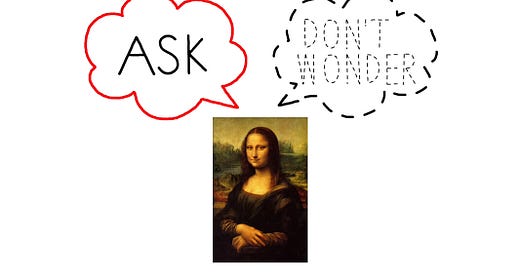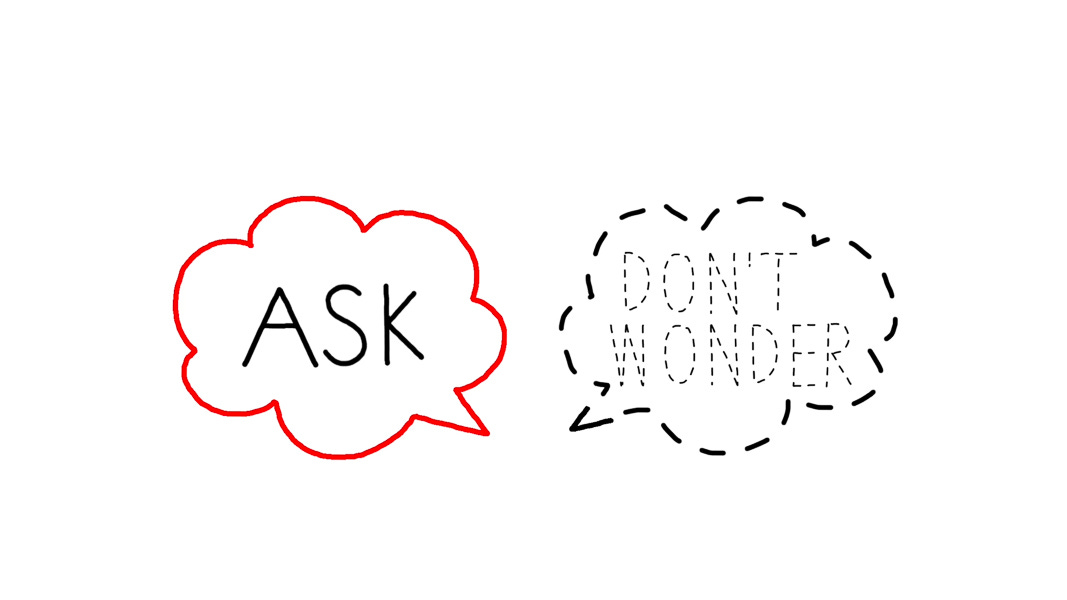For me, one of the outcomes of the pandemic was learning to live with uncertainty and seeking out where I could remove unnecessary tension. In too many situations, uncertainty was caused by trying to figure out what was going on rather than just asking the people who knew. As part of my Daily Questions (see: Triggers by MG), I added: Did I ask instead of wonder? In other words, rather than wondering what someone was thinking or what was happening, I just asked. Mystery solved! It turned out that this idea was one of the most beneficial skills I learned from the pandemic experience. I continue to apply that learning to great effect. Here are some of the situations I found helpful.
Ask when someone else already has the answer. As I started to apply Ask Don't Wonder, I was shocked at how often I would try to figure out solutions that other people already had. I stopped wondering how to do something and asked. Instead of wondering when we were meeting or who was coming, I asked. Whenever I find myself "wondering" about something and trying to figure out what the right answer is or what the possible solution could be, I “asked” someone who knew. It seems simple, but I frequently observe many instances when someone tries to find an answer when someone else already has it. Now, the amount of time I save and the stress I avoid by not being in the state (often spiral) of wondering is astonishing!
Ask about the unknown. At other times, I found myself wondering when there was some unknown information concerning a topic about which I cared. By asking others about it, I discovered two different positive outcomes. Sometimes I found that there was indeed a known answer to my question, and others would tell me the answer, putting an end to my wondering. Other times they would not know either, and we could wonder together and have an enjoyable collaboration exploring the possibilities of what might be. Collaborative wondering brought us together, eased the tension from my not knowing, and created some ideas and solutions that took us in unexpected directions. I found joint wondering delightful, and after discussing an idea with others I found that I had the choice of either doing further research or simply letting it go.
Ask when it’s uncomfortable. The most profound shift came from asking rather than wondering about things that I feared might offend others. Take care with this one, but my experience has been that by asking rather than wondering, I would uncover information that helped the situation progress rather than harming the situation through offense. Want to know how a friend/co-worker feels about something? Ask. Wondering about whether or not your action/words offended someone? Ask. It turns out that even in cases where there is some risk, the risk can be mitigated by asking and dealing with the results rather than wondering and avoiding them. Be considerate and go easy, but I have found that good communication builds strong bridges and that starts with asking rather than wondering.
The pandemic taught us that in life and leadership, there is already too much uncertainty. We need to reduce it wherever we can. My daughter Lily has been trying out Ask Don't Wonder and calls it a game-changer. Literally. It reduces the "game" of relationships and allows more honest and open interaction. It also changes dynamics on ZOOM calls where less body language equals less information. Try it for yourself. Please share the circumstances you find helpful in the comments so that others can benefit from your insights. If your experience is anything like mine has been, 2023 can become the Year of an Ask Don't Wonderful Life.
Real Time Leadership by Carol Kauffman PhD and David Noble Is available today!
Carol and David are great friends, world class leadership coaches and members of the 100 Coaches. Here is what Marshall had to say about their new book:
Real Time Leadership gives you a fascinating ‘behind closed doors’ view of what executive coaching is really like.
The M.O.V.E. framework, detailed in this book, has been very helpful to me in my own coaching practice and in my own life.
Be Mindfully Alert - I am a philosophical Buddhist and have been studying Buddhism for over 50 years. Carol taught me one question that, to me, captures the essence of Buddhism better than any I have I have ever heard. I now share this question with my coaching and leadership development clients every day. ‘Am I being the person that I want to be, right now?’ The section on mindfulness captures the essence of how we can remain mindful and present – in a world filled with seemingly endless distractions. On many days, I need this help more than my clients!
Generate Options – Busy leaders tend to be impatient. I am no different. We usually have a need to ‘come up with a solution and move on’. This section explains the value of carefully weighing alternatives before leaping into action. A little reflection in the beginning can eliminate a lot of grief in the end. Although I found this part of the book very helpful in my coaching practice, I found it even more helpful in planning my own life!
Validate Your Vantage Point – Possibly the most unique section of the book. Our perception of ‘What is really going on here?’ is often distorted by factors that are outside of our awareness. Learning how our views can be distorted and how to overcome this distortion can be immensely valuable when we are in a real-time leadership challenge. Every situation does not require the same degree of urgency or understanding. Learning when a ‘high-def’ view is needed – as opposed to when a ‘grainy’ view is good enough, can help leaders save time and focus on what matters most. I have never heard this concept explained so clearly.
Engage and Effect Change – The biggest challenge leaders face is not ‘understanding the practice of leadership’, it is ‘practicing their understanding of leadership’. David and Carol provide very practical advice on not only how to effect change, but also how to scale change, to create an impact throughout the organization. This section is especially important for entrepreneurs, who can be wonderful at creating the business – and terrible at scaling the business.
They also skillfully apply their work to two major Real Time challenges all leaders must face. First is stepping into a new role. These chapters are a new and valuable take on those first 90 days and beyond. Second is a close up look at how to survive disruption and more importantly, how to create disruption, use it to innovate and make a positive impact.
The book isn’t just about being successful. It is about becoming an extraordinary leader and human being.
David and Carol are among the world’s greatest leadership coaches. Very few people can hire them for one-on-one coaching. Thanks to this book, we can all learn from them and immediately apply what we have learned – both at work and at home. This book has helped me. I am sure it can help you as well.
With love, wonder and gratitude. Scott












"Ask Don't Wonder", a wonderfully condensed insight Scott. Thank you. I see this often as the employee engagement reports come back in at year end, pages of graphs, loads of data points and the mental energy that executives generate speculating why the scores are what they are and what can and should be done about it, without engaging in too much asking. I am thinking that printing and distributing some T-shirts with "Ask Don't Wonder" could be an effective catalytic mechanism!